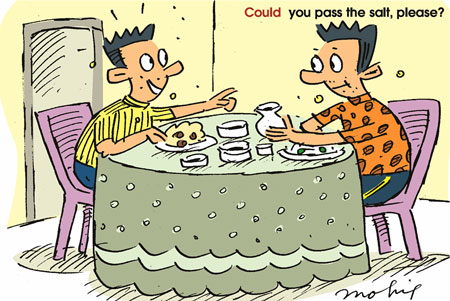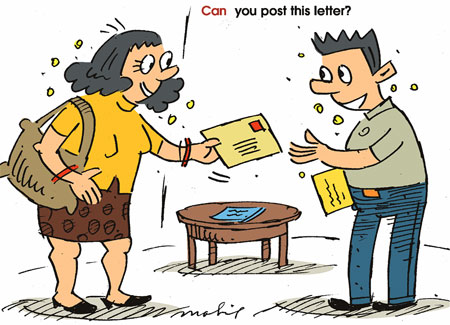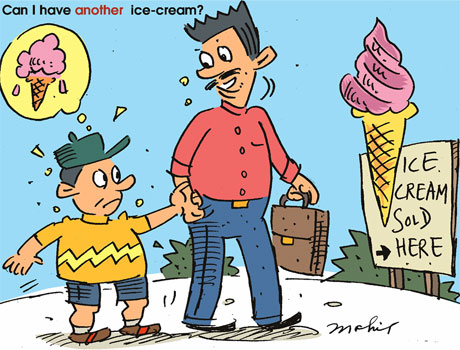|

by R. S. Karunaratne
How to use modal verbs
‘Can, could, may’ and ‘might’ are considered to be modal verbs. They
cannot stand alone in a sentence except in speech.
In a statement, modal verbs are used along with other verbs.

[May ]
You may go home now.
She may apply for the post advertised.
I may meet him tomorrow at the library.
We may visit him during the lunch break.
He may come at any moment.
[Might]
Rex might be elected as the chairman.
They might leave for Australia tomorrow.
I might be able to help you.
He might have played a joke on us.
When he finishes his homework, he might go to bed.
[Can ]
Can animals think?
Can you post this letter?
Can I speak to the manager?
Nowadays, many young children can use computers.
Can I get you something to drink?
[Could]
Could you be a little more patient with him?
Could I practise a tune on your violin?
Could you pass the salt, please?
Could you help me to catch some birds?
Could my sister swim in your pool?
We use ‘can’ and ‘could’ to ask for permission or to make a request.
‘Could’ is more polite than ‘can’.
Can / Could I use your bathroom?
Can / Could you pass me the dictionary?
Can / Could you be a little more polite?
Can / Could you help me to draw a lion?
Can / Could I join your group?

We use ‘may’ or ‘might’ to ask for permission in a formal manner.
‘Might’ shows that the speaker is more hesitant or unsure.
A: Could I meet the chairman?
B: You might .
A: Will the train come on time?
B: It might .
A: Will he give me a lift to school?
B: He might .
A: Will they comeback to Sri Lanka?
B: They might .
A: Will he punish me for taking Rs. 10 from his purse?
B: He might .
‘Can’ is also used to refer to the ability to do something.
He can repair any type of vehicles.
We can learn English if we make an effort.
You can swim across the river easily.
Can you write an essay on ‘Democracy’.
She can draw very well but she has decided to become a journalist.
[Activity ]
Underline the correct words in the following sentences. Check your
answers with the key.
1. Can / Might I help you?
2. When grandmother was young, she can/could dance very well.
3. Could / May you help my brother to find a job?
4. You may / might borrow any books from the school library.
5. Can / May you read without your spectacles?
6. Mother may / may be looking for me now.
7. Can we / We can get a lift to school today?
8. Irangani might / can return to Sri Lanka next month.
9. Lalith might / can be having a bath.
10. You may / might meet the principal now.
[Key]
1. Can 2. could 3. Could 4. may 5. Can 6. may be 7. Can we 8. might
9. might 10. may
Essential communication
Avoid using formal expressions in speech. Use natural English when
you speak to others.
1. How to ask for advice.
When you need advice, do not say, “Can you give me an advice?’ There
are many other ways to seek advice. Try one of them.
What do you think I should do in this situation?
Can I ask your opinion about this matter?
Do you think I should follow this course?
I am thinking of migrating to Australia.
What do you think?
2. How to give advice.
When you give advice, do not say, “ I advise you to ...’ There are
many other ways to offer advice.
You should see a specialist if you are really worried about it.
If I were you, I’d not sit the examination this year.
What you ought to do is make a complaint to the police.
What you need is some rest.
Make sure you have the National Identity Card with you all the time.
The best thing is to give up smoking.
3. How to make a suggestion.
There’s no need to say, “I suggest ...” Use any of the following
expressions.
Let’s have some tea.
We could ask the driver to stop for refreshments.
Why don’t you do it yourself?
What about going out for lunch?
Shall I carry the bag for you?
4. How to reply to a suggestion.
Positive :
A: How about having lunch somewhere?
B: Yes, I’m hungry.
A: Let’s go and see our friend in hospital.
B: OK.
A: What about a game of tennis?
B: Good idea.
A: Shall I organise a get-together tomorrow?
B: That sounds good.
Negative :
When you say ‘no’ to a suggestion, give a reason.
A: Let’s go to Kandy on Sunday.
B: Sorry, I can’t. I have classes.
5. How to offer to do something for somebody.
A: Would you like me to help you with English?
B: Yes, please.
A: Would you like some tea?
B: Thanks. Is there a hotel close by?
A: Would you like a drink?
B: That’s very kind of you. A cup of tea would do.
A: Would you like a drink?
B: No, thanks. I have to catch the train.
6. Invitations .
A: Would you like to play cricket this weekend?
B: Yes, I’d like that.
A: We’re going to see the circus. Do you want to come?
B: That sounds great! Thanks.
A: Would you like to come for dinner tonight?
B: Sorry, I have an assignment to finish.
A: Shall we go for a film?
B: Thanks for asking me. But I am busy tonight.
Starters:
Indefinite articles
‘A’ and ‘an’ are the indefinite articles.
‘A’ means ‘one’.
Do you want a film roll?
Narmada works in a bank?
She wants to ask a question.

When she was a child, she read many detective stories.
Tokyo is a large city in the world.
‘An’ also means ‘one’. However, ‘an’ is used before words beginning
with a vowel sound. The vowels are: ‘a, e, i. o’ and ‘u’
My grandmother lives in an old house.
He used to take an umbrella wherever he went.
Can you give me an envelope.
Madolduva is an interesting book.
An inspector is waiting to see you.
Exceptions to the general rule:
Some words beginning with a consonant can have a vowel sound.
Then we use ‘an’ before them.
I waited for an hour to buy a stamp at the post office!
Rex is an honourable man.
Your father is an honest person.
Note: In the above words (hour, honourable and honest ) ‘h’ is not
pronounced.
Some words beginning with one of the vowels may not have the vowel
sound.
Sanduni is a university lecturer.
Germany is a European country.
M.G. Mendis was a union leader.
Have you seen a unicorn ?
The words ‘university, European, union’ and ‘unicorn’ are pronounced
‘yuniversity, yuropean, yunion’ and ‘yunicorn.’ Therefore, we use ‘a’
before them.
We use ‘a’ or ‘an’ for jobs.
Rajitha is a dentist.
Kamal is an engineer.
I always wanted to be a teacher.
Rajesh is an actor.
Picasso was a well-known painter.
Punchihewa is an artist.
We make the word ‘another’ with ‘an + other.’
Can I have another ice-cream?
Open another window. It’s very hot.
Do you want another pen?
I saw another man buying a copy of your book.
‘Guy’ is another word for ‘man’.
[Activity ]
Put in ‘a’ or ‘an’ where necessary. Check your answers with the key.
1. Sajini bought new sari for her wedding.
2. We went to see film last night.
3. Jagath is illustrator.
4. Monday is busy day for banks.
5. Tharindu ate apple and piece of cake.
6. Germany is industrial country.
7. Did you have bath in the morning?
8. Sumudu works in newspaper office.
9. You are asking me difficult question.
10. The Smiths stayed at expensive hotel.
[Key]
1. Sajini bought a new sari for her wedding.
2. We went to see a film last night.
3. Jagath is an illustrator.
4. Monday is a busy day for banks.
5. Tharindu ate an apple and a piece of cake.
6. Germany is an industrial country.
7. Did you have a bath in the morning?
8. Sumudu works in a newspaper office.
9. You are asking me a difficult question.
10. The Smiths stayed at an expensive hotel.
Who am I?
Fill in the blanks with suitable words and check your answers with
the key.
1. I work in a hospital. I prescribe medicine to people who are ill.
I am a ..........................
2. I give lessons to students in a big school.
I am a .........................
3. I design roads and bridges.
I am an .......................
4. I serve customers in a restaurant.
I am a ........................
5. I give legal advice and appear for people in courts.
I am a ........................
6. I work in a large office typing letters and reports.
I am a .......................
7. I grow all kinds of vegetables in a large estate.
I am a .......................
8. I cut and trim people’s hair so that they look nice.
I am a .......................
9. I repair all kinds of vehicles in a small garage.
I am a .......................
10. I arrest people who break the law.
I am a .......................
[Key]
1. doctor 2. teacher 3. engineer 4. waiter 5. lawyer 6. typist 7.
farmer 8. hairdresser 9. mechanic 10. policeman
Building blocks
We add a prefix to an existing word to make a new word.In
thefollowing exercise we give the prefixes with their meanings. Write
three words, beginning with the letters in brackets, for each prefix.
Check your answers with the key.
1. The prefix ‘ab’ means ‘away from’ or ‘not’.
ab(n) ................
ab(u) ................
ab(s) ................
2. The prefix ‘ad’ means ‘towards’.
add(r) ...............
ad(j) .................
ad(m) ...............
3. The prefix ‘al’ means ‘all’.
al(t) .................
al(w) ................
al(m) ................
4. The prefix ‘ante’ means ‘before’.
ante(n) .............
ante(r) ..............
ante(c) .............
5. The prefix ‘anti’ means ‘against’.
anti(w) ............
anti(s) .............
anti(d) .............
6. The prefix ‘arch’ means ‘chief’.
arch(b) .............
arch(e) .............
arch(a) .............
7. The prefix ‘auto’ means ‘self’.
auto(g) ...............
auto(b) ...............
auto(m) ..............
8. The prefix ‘bene’ means ‘good’ or ‘well’.
bene(f) ..............
bene(v) ..............
bene(f) ..............
9. The prefix ‘bi’ means ‘two’ or ‘twice’.
bi(c) ..................
bi(m) .................
bi(f) ..................
10. The prefix ‘circum’ means ‘around’.
circum(f) ...............
circum(s) ...............
circum(n) ..............
[Key]
1. abnormal, abuse, abscond 2. address, adjust, admit 3.altogether,
always, almighty 4. antenatal, anteroom, antecedent 5. antiwar,
antisocial, antidepressant 6. archbishop, arch-enemy, archangel 7.
autograph, autobiography, automobile 8. benefit, benevolent, benefactor
9. bicycle, bimonthly, bifocals 10. circumference, circumstance,
circumnavigate |

